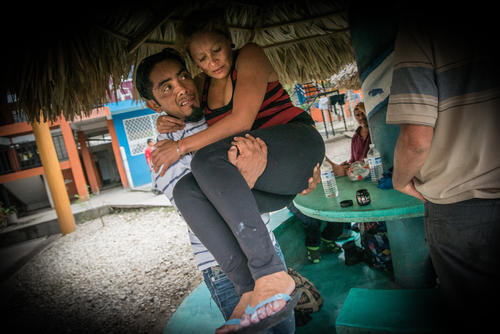
29,200
29,2
8,600
8,6
3,000
3,
Although the number of migrants in transit through Mexico dropped slightly in 2017, hundreds of thousands of people fled violence and poverty in Guatemala, Honduras and El Salvador. Many were exposed to further violence and inhumane treatment during their journey.
MSF runs a number of projects in the country, providing medical and mental healthcare. In 2017, teams were also deployed to help people affected by two major earthquakes.
Tenosique
In Tenosique, the MSF team, consisting of two psychologists, a doctor and a social worker, offers assistance to migrants in Shelter 72. In 2017, the team scaled up its assistance for victims of sexual violence.
Guadalajara
Guadalajara is on the northern transmigrant route, where levels of violence are particularly high. An MSF team started assisting migrants in the FM4 Shelter in February 2017, and a mobile clinic visits the Casa del Migrante in Coatzacoalcos, offering psychological and social care.
Mexico City
In July, MSF opened a specialised therapeutic centre, the Centre for Integral Action, for displaced people who have been victims of extreme violence, torture and ill treatment. The centre can accommodate 28 patients with their families.
Reynosa
MSF expanded its activities in Reynosa (Tamaulipas state), to provide medical, psychological and social care in one of Mexico’s most violent areas. A team composed of a doctor, a nurse and a psychologist offers healthcare at a fixed clinic, and refers patients when necessary. The team also runs mobile clinics in two shelters for migrants and provides medical care to victims of sexual violence, including post-exposure prophylaxis and mental health support.
Acapulco
In Acapulco, MSF expanded its activities to new neighbourhoods (Progreso, Ciudad Renacimiento and Zapata) after consolidating its project in Colonia Jardín. The team provides services around the clock in Renacimiento hospital. In 2017, MSF staff treated 200 victims of sexual violence and carried out 2,307 individual mental health consultations, as well as facilitating community support groups and activities in each of the neighbourhoods.
Tierra Caliente
In Tierra Caliente (Guerrero state), rural health posts are frequently closed due to violence, threats, turf wars and a lack of staff. MSF has two mobile teams carrying out regular medical and mental health clinics in these areas. Almost 10,000 medical consultations and 1,300 individual mental health consultations were conducted in 2017.
Earthquake responses
On 7 and 19 September, several states in central and southern Mexico were affected by two separate earthquakes, which left hundreds dead, thousands injured and many people homeless. In response, MSF deployed seven teams in Oaxaca, Puebla, Morelos, State of Mexico and Mexico City, which provided more than 1,000 medical consultations, 674 individual mental health consultations and 661 group mental health sessions in an intervention that lasted more than two months. The teams also distributed basic survival kits and donated tents to around 200 families.


















